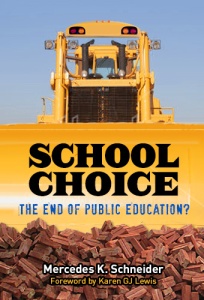Rhode Island School District to Use Collection Agency to Collect School Lunch Debt
I teach in southern Louisiana, and our school’s lunch policy does not include fronting meals to students who do not qualify for free lunch. (Over the years, I have on numerous occasions either loaned or given students lunch money or directly provided them with food. However, in all cases, this was my personal decision.)
So, the idea of a policy that allows for students (parents?) to accrue lunch debt is not part of my K12 experience either as a southern Louisiana teacher or former student.
If districts have a policy of fronting meals, those districts should also have in place a means of paying for those meals if students and parents/guardians do not pay. Otherwise, the resulting debt could put a district in fiscal crisis– one that might result in, well, employing a collection agency.
Such is the situation for the Cranston School District (Rhode Island).
The Cranston School District advertises this “unpaid meal policy”, which includes the following information for parents/guardians:
Student wanting a lunch and not having money to purchase a lunch will be allowed to charge a lunch with repayment within two (2) school days.
Once a student has charged five (5) meals (middle\high school $16.25 & elementary $12.50) and no payment has been received, that student will receive a lunch consisting of a sunny butter sandwich, fruit, and milk in place of a hot lunch. This meal maintains the USDA standards surrounding reimbursable meals and will be charged at full price to the student’s account.
Okay. Let’s see: No money; meal provided anyway with payment expected in two days– but that two-day payment isn’t really required because we’ll repeat fronting the meals four more times, and if still no payment, we’ll front a less desirable meal (but a meal nonetheless) ad infinitum as we continue to charge the full price, but not really because we’ve been giving away all of these meals without requiring any payment from student/parent/guardian prior to meal consumption.
To further dull any incentive for students/parents/guardians to pay, tell the public that the district is prepared to absorb the cost:
At the end of the school year, the uncollected meal charges must be paid to the Food Service fund from some other funding source. Funds will be designated during the budget processes for these anticipated costs.
So, it seems that the district anticipates that it will be saddled with uncollected meal debt at the end of the school year and that the district advertises (intentionally or not) that the district is prepared to foot the bill.
However, in its next statement, the Cranston School District admonishes parents/guardians that they must settle any unpaid balance by the year’s end, or…. nothing. No consequence:
Parents are expected to pay the final bill at the end of the school year. No amounts will be carried over.
Therefore, it comes as no surprise that at school year’s end, the Cranston School District faces thousands of dollars in unpaid school lunch debt.
But so much for budgeting for anticipated costs:
On December 06, 2018, NBC4.com reported that the Cranston School District has decided to retain the services of a collection agency to collect lunch debt:
The Cranston School District hired a collection agency to recover unpaid lunch balances.
In a letter to parents obtained by NBC 10 News, Raymond Votto Jr., chief operating officer of Cranston Public Schools, said the district has previously tried to collect outstanding lunch bills “without much success.” …
Votto said between Sept. 1, 2016 and June 30, 2018, the school district wrote off $95,508. He said the unpaid balance for the current academic year is $45,859. …
Votto said parents who owe $20 or more and who haven’t paid off the balance within 60 days will receive a letter from the collection agency starting next year.
Students who owe money for multiple meals won’t go hungry, the district said. Students will continue to get the same entrée that paying students receive. In the past, the district offered students who owed money an alternative meal – a sunny butter sandwich, fruit and milk — but stopped doing that when it realized parents still weren’t paying the lunch bills. …
The school district told NBC 10 it wanted to take a soft approach and said the collection agency will not be calling parents, but rather mailing them.
Here’s an idea: Revamp the policy of fronting meals to align it with district revenue to pay for those meals. If the district revenue is not there, do not advance the meal. If the district wants to advance the meals, have the revenue in place to cover those meals if parents/guardians do not pay.
In other words, align policy with fiscal capability.
And clean up the mixed messaging on that “unpaid meal policy” page.

___________________________________________________________________________________


Tracy O’Connell Novick (Field Director for the MA Association of School Committees) has a good thread on this situation.
The past 2 districts where I have worked in Washington State provide a lunch if a child is lunchless. I have never asked what happens when the family can’t pay. I love the policy, but never questioned the logistics.
There is actually a very easy way to collect these debts. Many states use it for collecting delinquent child support. The state needs enabling legislation. With it, the school would turn the amount owing over to the state tax board. The state tax board wold pay the school the amount owing. Then the state tax board takes care of the collections. The tax board has the systems needed to collect the money.
This could also be a method of combating truancy. Parents whose children are truant could be required to reimburse the state for the daily money that the school loses because the child is not in school. I suspect that parental involvement in their children attending school would markedly increase if they lost money when the child was not there.